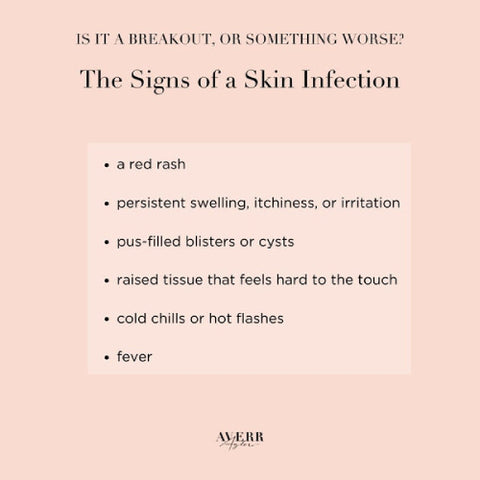
Tattoo Acne: Caring for Your Skin Without Ruining Your Ink
Tattoos have been growing in popularity for years and are becoming common among people from all walks of life. It’s not just your edgy bartender, anymore. From your cute neighbor to your veterinarian, anyone may be rocking inked skin.
Even here in the Averr Aglow content team, two-thirds of us have tattoos (myself included). Several of us — myself still included — have also struggled with acne.
The first time I saw a little bump appear on my freshly tattooed shoulder, I was frozen by my ignorance. Was it a pimple? Was it some kind of reaction? Either way, could I treat it without ruining my new ink?
My tattoos are special and meaningful to me, so I wasn’t about to try skincare products all willy-nilly and hope for the best. You shouldn’t, either!
Luckily, you don’t have to.
If you’re worried about preserving tattoos on acne-prone skin, look no further. The time for questions is over. Now, it’s time for answers.
Tattooing Acne-Prone Skin
First things first. If you have acne-prone skin, can you even get tattooed?
Certainly!
But if you tend to break out around the area being tattooed, timing is key. Trying to tattoo over an active breakout can damage your skin and spread bacteria, sometimes compromising the design of your gorgeous new art.
Don’t gamble on the quality of your tattoo! Postpone the appointment until your skin has calmed down and then reschedule. It’ll be worth the wait.
Tattooing Over Acne Scars
Some people get cover-up tattoos to hide scars, including pockmarks left behind by body acne. Done well, the color and placement of a tattoo can effectively disguise those insecurities and make them much less noticeable.
There is one caveat. While tattoos can be a pretty, personalized way to change the color and appearance of scarring, they won’t alter the texture. Depending on the type of scar, you still show raised patches or indentations.
And avoid tattooing over recent scarring! New scar tissue is extremely sensitive and will make for a very painful tattoo session.
What Causes Bumps on New Tattoos
Congratulations on your stunning new artwork! May it heal swiftly and cleanly, with minimum discomfort.
But on rare occasions, your new tattoo may arrive with complications. If you experience intense itchiness, a red rash, or tiny white bumps on the site of your recent ink, check possible causes to determine the culprit:
- Skincare irritation: Certain skincare products and ingredients may cause extra discomfort to healing tattoos. Harsh chemicals, acids, dyes, preservatives, and fragrances all have the potential to upset tattooed skin — even if you normally use them without a problem.
- Inflammation: Swelling is natural after a tattoo. Technically, you’ve just endured skin trauma, and your immune system is rushing to your defense. It’s nothing to worry about...usually. But inflammation can sometimes contribute to breakouts on new tattoos, especially if you have an underlying skin condition like psoriasis or eczema.
- Constricting clothing or bandages: Rubbing or chafing will irritate the tender skin on your new tattoo, including friction from clothing or too-tight bandaging.
- Allergies: Some people experience allergic reactions after a tattoo, having sensitivities to compounds in the ink. Red ink, in particular, seems to trigger the most allergic reactions. (And for our readers in the US, be advised: tattoo ink is not regulated by the FDA. Nor is it subject to toxicology testing until after complaints are submitted. So if you have allergies, tread carefully. It can be difficult to determine the safety of inks for your skin.)
- Excess moisture: It is essential to soothe and moisturize your healing skin, but you can have too much of a good thing. For example, excess moisture can encourage the growth of acne-causing bacteria. It can also cause scabbing, bubbling, or color loss in your completed tattoo! Avoid, avoid, avoid.
- Skin infection: A new tattoo is essentially an open wound. And while your skin recovers, all that surface damage will leave it vulnerable to invaders like bacteria. If you’re experiencing serious discomfort, watch out for signs of infection. Mild skin infections can be treated with antibacterial ointments, but seek medical advice if the symptoms persist.

What Causes Pimples on Older Tattoos
Blemishes don’t only affect new tattoos. Even if your art has been aging gracefully, it can fall prey to various rashes and breakouts.
The most common causes include :
- A predisposition for acne: If you are already prone to acne in the area of your tattoo, I’m sorry to say that the tattoo won’t magically halt your flare-ups. Acne is typically caused by excess skin oil, dead skin cells, and bacteria, which all team up to clog and inflame your pores. Tattooed skin is not exempt. If you struggle with body acne, blemishes, and cysts may still appear to disrupt your sweet back piece. And of course, acne can be a huge annoyance if you’ve daringly gone for a face tattoo. (Mike Tyson, is that you?)
Acne-prone skin? Achieve the fresh face of your dreams with Averr Aglow’s Luminous Clear Skin Kit
- Increased skin sensitivity: Even after fully healing, tattooed skin tends to be more sensitive to topical irritants and UV damage. Unfortunately, both of these factors can contribute to acne by drying out your skin. When your skin is parched from harsh cleansers or too much sun, it overcompensates by producing more skin oil. This excess oil can mix with dead skin cells to plug your pores — the first step towards a new breakout.
- A delayed allergic reaction: Particularly if your tattoo includes red ink. Red ink causes more negative reactions than any other color, and such reactions have been known to appear well after the tattoo has healed. Check the layout of your breakout or rash. Is it localized around areas of red coloration in your tattoo, while other areas are fine? You may be sensitive to red ink. Talk to your doctor about treatments such as topical steroid ointments.
How to Prevent Breakouts Around Your Tattoo
So with all these possible blemish causes, how can you keep your tattoo calm and clear?
- Don’t smother your skin: This is a good rule of thumb at all times, as too much chafing can lead to breakouts known as acne mechanica. Giving your skin some space is especially important for new tattoos. Depending on your local regulations, the tattoo artist may cover new ink with proper medical dressings...or they may opt for the cheaper option of plastic wrap. If it’s the latter, remove any protective plastic wrap within a few hours following your appointment, so that your skin isn’t trapped with excess moisture. And as your new tattoo recovers, don’t subject it to overly tight bandaging or thick, suffocating layers of ointment. A thin coating will do!
- Dodge pore-cloggers: When choosing a moisturizer, lotion, or body butter, look for products that won’t clog your pores. Some may be labeled “non-comedogenic,” implying that they are free of pore-clogging ingredients. But the term isn’t regulated, so it helps to double-check the ingredient list yourself. Look out for moisturizers containing paraffin, mineral oil, petroleum jelly, or coconut oil, which can be too heavy for acne-prone complexions. Instead, seek out light, natural hydrators like jojoba or manuka oil.
We love jojoba! Find this incredible skin-balancing botanical in our Radiant Cleansing Nectar.
- Avoid irritating products: Treat your tattooed skin delicately. It is extra sensitive to irritation now, so select skincare products without any severe chemicals, preservatives, or artificial fragrances. Gentle, natural skincare is the way to go!
- Protect new tattoos from infection: Infection is no fun and can permanently ruin your tattoo’s appearance. Be careful to always wash your hands before touching the skin around a fresh tattoo, and regularly cleanse with mild soap.
How to Safely Treat Tattoo Acne
If you discover blemishes on your tattoo, it’s okay — you don’t have to let them spoil your artwork’s integrity. Follow these tips to help diminish those pimples and keep your tattoo looking sharp :
- Cleanse and moisturize: In the fight against acne, cleansing and moisturizing are key. Keep the area clean to help unclog pores and prevent the spread of bacteria. Follow with a moisturizer to replenish your skin’s hydration and balance oiliness. (Btw: when it comes to the oh-so-important skin on your face, there’s no better duo than our Radiant Cleansing Nectar and Flawless Nourishment Cream.)
- ...But avoid harsh acne treatments: During a breakout, you may be tempted to pick up acne-fighting products containing salicylic acid or benzoyl peroxide. DON’T! SA and BP can irritate your skin and strip it of vital hydration. On a new tattoo, this can interfere with proper healing. And even on an older tattoo, nuclear-strength treatments like SA and BP can leave your ink faded and patchy.
- Don’t pop your pimples: Never pop your pimples, tattoo, or any tattoo. It can cause scarring, increase your risk of infection, and spread bacteria. (Who wants scarring messing up that beautiful skin art?) It’s even worse to pick at blemishes around a new tattoo. Picking can cause color loss and faded ink, giving your tattoo a dull, uneven finish.
- Beware over-scrubbing: Once your tattoo is all healed up, you may be tempted to combat any bumps with a good scrub. But don’t go crazy with the exfoliation — especially with products that contain physical exfoliators like microbeads. Intense scrubbing damages your skin’s upper layers, leaving you vulnerable to harmful bacteria, pollutants, and moisture loss. It also scrubs down to ink deposits faster, shortening your tattoo’s shelf-life. For gentler exfoliation on your fully-healed tattoo, try our Rejuvenating Essence Body Polish. Rich with antioxidants, it helps sweep away dead skin and impurities while nourishing your skin with natural ingredients like lingonberry and volcanic ash. Enjoy in the bath or shower for a spa-worthy experience that leaves your skin soft and glowing.
Ultimately, tattoos are a reflection of who we are and who we want to be. Don’t let bumps and blemishes mar your chance for self-expression. Treat your tattooed skin with love, and let your true colors shine through!
What to Do Next? Try Averr Aglow’s Clear Skin Kit
Tired of feeling lost and confused about what you should do to get clear, smooth skin? Order the Clear Skin Kit.
The Clear Skin Kit contains products specially crafted with the perfect blend of natural ingredients that help soothe and calm red, irritated skin while also clearing up breakouts. If you struggle with sensitive acne/breakout-prone skin, hormonal acne, cystic acne, or rosacea, then you’ll be happy you found this complete routine.
Please understand, that results may vary, we’re not selling you a miracle product and would never try to position or state that you will get a true result in only a few days. In our clinical trials, most users found the most results at the 30-day and then the 56-day mark by sticking with our routine.
What is Averr Aglow®?
Averr means Truth. We have pioneered a revolutionary no-rinse cleansing routine specifically tailored to address problematic skin issues.
Hi, I’m Camille, founder of Averr Aglow, and I help adult women who are battling breakouts and acne get clear skin results like they have never seen before, even if nothing has worked for them in the past.
After battling breakouts for over 16 years, trying every skincare product under the sun, and visiting countless professionals like dermatologists, nutritionists, and hormonal doctors, I finally learned why nothing seemed to work on clearing up my skin, what truly causes breakouts and acne, and EXACTLY what to do to get clear skin results – and I want to help you do the same.
Let me help you! Read my full testimonial here.






